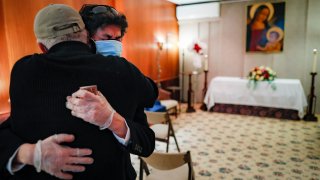
An analysis released Monday by researchers from USC and two other universities estimates that several months into the coronavirus pandemic, more than 1 million Americans are grieving the death of a grandparent, parent, sibling, spouse or child from COVID-19.
The newly developed "bereavement multiplier" metric also provides a clearer picture of how the crisis is impacting different racial, ethnic and age groups, according to researchers from USC, Penn State and the University of Western Ontario.
The analysis, published in the Proceedings of the National Academy of Sciences of the United States of America, found that roughly nine close family members are affected by each coronavirus death. With an estimated 137,871 lives lost, that corresponds with nearly 1.22 million people dealing with the loss of a relative.
"Already, more than a million Americans will forever have a hole in their family," said study author Emily Smith-Greenaway, an associate professor of sociology and spatial sciences at the USC Dornsife College of Letters, Arts and Sciences. "In just a few short months, over one million Americans have experienced an irreplaceable loss that not only leaves them grieving and possibly traumatized but may come with long-lasting health and economic consequences for themselves and others in their family."
The collective toll of the crisis is far greater – and longer lasting – when considering all the individuals grieving each death, the researchers concluded.
Although hospitalizations and deaths from COVID-19 are more heavily concentrated among older patients, many young people are suffering from the sudden death of their parents and grandparents, they said.
Grief can have long-lasting effects, with some people experiencing serious and prolonged mental health consequences, including major depression and anxiety. Bereavement is also tied to physical health risks that can include worse cardiovascular health and mortality, according to the study's authors.
Local
Get Los Angeles's latest local news on crime, entertainment, weather, schools, COVID, cost of living and more. Here's your go-to source for today's LA news.
These risks tend to be higher in the case of unexpected deaths.
"In the news cycle, the emphasis is on tracking the total number of lives lost, but what's missing is how these premature deaths reflect in family systems," Smith-Greenaway said. "What about the numerous loved ones left behind?"
Researchers also raised concerns that disproportionate rates of death among Black Americans will heighten racial inequalities in the U.S.
"There are substantial concerns about the health impacts of COVID-19 for individuals, but one area that has received less attention is how the deaths caused by this disease will reverberate through families," said study author Ashton Verdery, an associate professor of sociology, demography and social data analytics at Penn State University. "Our results show that these impacts will be substantial, they'll affect people at all ages, and they may exacerbate existing inequalities in bereavement and social support."



